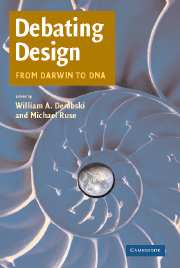Book contents
- Frontmatter
- Contents
- Notes on Contributors
- Debating Design
- INTRODUCTION
- PART I DARWINISM
- PART II COMPLEX SELF-ORGANIZATION
- 8 Prolegomenon to a General Biology
- 9 Darwinism, Design, and Complex Systems Dynamics
- 10 Emergent Complexity, Teleology, and the Arrow of Time
- 11 The Emergence of Biological Value
- PART III THEISTIC EVOLUTION
- PART IV INTELLIGENT DESIGN
- Index
10 - Emergent Complexity, Teleology, and the Arrow of Time
Published online by Cambridge University Press: 05 June 2012
- Frontmatter
- Contents
- Notes on Contributors
- Debating Design
- INTRODUCTION
- PART I DARWINISM
- PART II COMPLEX SELF-ORGANIZATION
- 8 Prolegomenon to a General Biology
- 9 Darwinism, Design, and Complex Systems Dynamics
- 10 Emergent Complexity, Teleology, and the Arrow of Time
- 11 The Emergence of Biological Value
- PART III THEISTIC EVOLUTION
- PART IV INTELLIGENT DESIGN
- Index
Summary
THE DYING UNIVERSE
In 1854, in one of the bleakest pronouncements in the history of science, the German physicist Hermann von Helmholtz claimed that the universe must be dying. He based his prediction on the Second Law of Thermodynamics, according to which there is a natural tendency for order to give way to chaos. It is not hard to find examples in the world about us: people grow old, snowmen melt, houses fall down, cars rust, and stars burn out. Although islands of order may appear in restricted regions (e.g., the birth of a baby, crystals emerging from a solute), the disorder of the environment will always increase by an amount sufficient to compensate. This one-way slide into disorder is measured by a quantity called entropy. A state of maximum disorder corresponds to thermodynamic equilibrium, from which no change or escape is possible (except in the sense of rare statistical fluctuations). Helmholtz reasoned that the quantity of entropy in the universe as a whole remorselessly rises, presaging an end state in the far future characterized by universal equilibrium, following which nothing of interest will happen. This state was soon dubbed the “heat death of the universe.”
Almost from the outset, the prediction of cosmic heat death after an extended period of slow decay and degeneration was subjected to theological interpretation. The most famous commentary was given by the philosopher Bertrand Russell in his book Why I Am Not a Christian, in the following terms:
All the labors of the ages, all the devotion, all the inspiration, all the noonday brightness of human genius are destined to extinction in the vast death of the solar system, and the whole temple of man's achievement must inevitably be buried beneath the debris of a universe in ruins. […]
- Type
- Chapter
- Information
- Debating DesignFrom Darwin to DNA, pp. 191 - 209Publisher: Cambridge University PressPrint publication year: 2004
- 4
- Cited by



